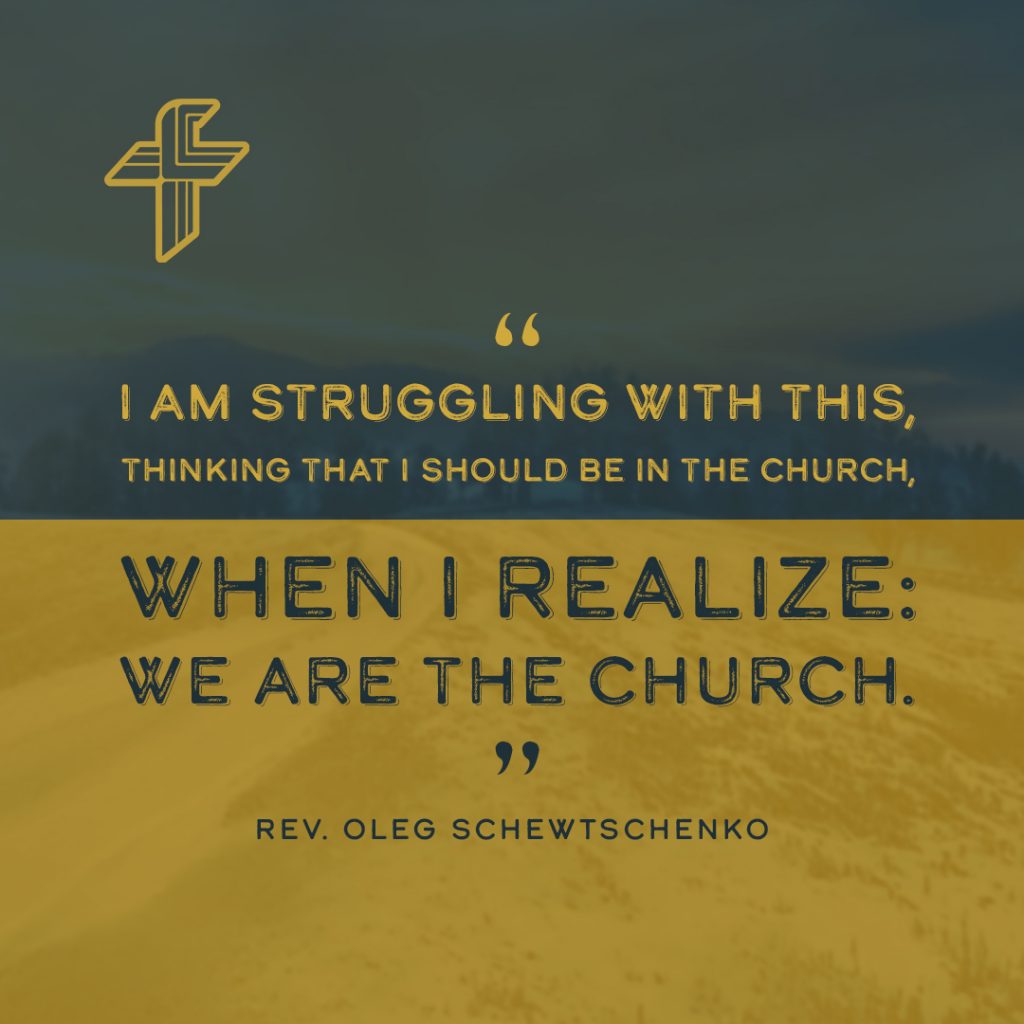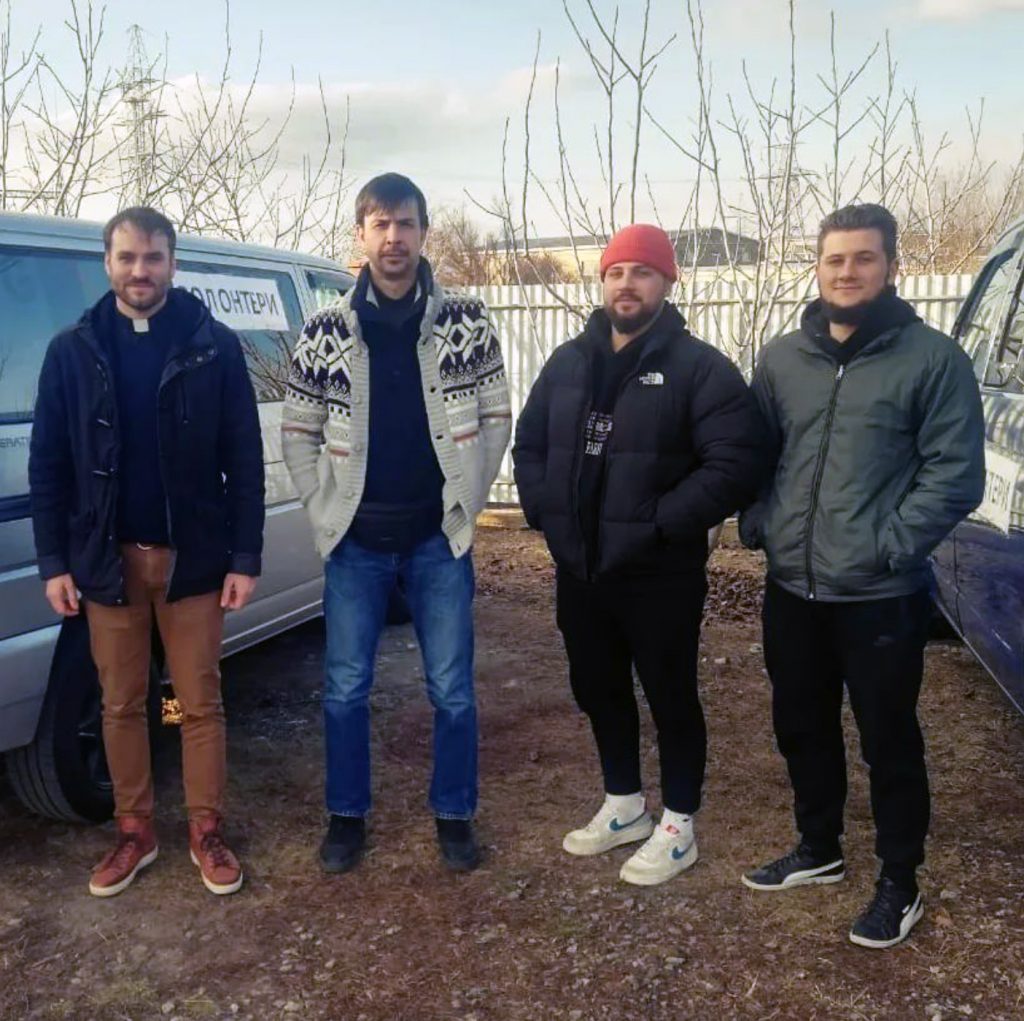Ukraine Update: Being the Church
 UKRAINE – Lutheran Church–Canada (LCC) issued a call to prayer and established a Ukraine Aid Fund to directly support the people of our partner church in Ukraine. LCC President Timothy Teuscher reports:
UKRAINE – Lutheran Church–Canada (LCC) issued a call to prayer and established a Ukraine Aid Fund to directly support the people of our partner church in Ukraine. LCC President Timothy Teuscher reports:
“As the conflict in Ukraine rages on, I urge all of our LCC congregations to continue to bring this tragic situation before the throne of God in our prayers—and especially for the pastors and congregations of the Synod of Evangelical Lutheran Churches in Ukraine (SELCU). To date so far we have received from LCC members $104,183.34 for relief of those who are suffering and in dire need of basic necessities of life. Thank you to all in our LCC family who have opened your hearts to our brothers and sisters in Christ in this time of their great need.”
We had the opportunity to speak with Rev. Oleg Schewtschenko (SELCU) who desires to share with the people of LCC some stories and updates concerning what the Lutheran church in Ukraine is doing to care for people spiritually and physically at this time:
Financial support is very crucial right now. Since the price for gas is going up quickly, delivery costs are going up and so is the price for groceries. In the small villages especially they have very few stores and so the price is going up so much that sometimes it costs three times what you would pay in the larger towns. We are buying as much as we can but it is getting difficult since now we have limitations. For example, as on person, I cannot buy more than two packages of spaghetti. Even though I am buying food for 100 people, the people in the stores are afraid that I am buying this food to resell it. We use pictures to show them that we don’t want to resell it, we want to share it with people who don’t have anything. The money that was sent will be used for things like this, to buy and deliver much-needed items to the people. Pastor Oleksiy Navrotskyy, your LCC missionary, our pastor, is serving as a chaplain right now. He is doing morning and evening devotions, since he is feeling sick with pneumonia and is unable to drive much. He is providing care to the people for their souls.
We are trying to see how we, as the Church, can serve. We gather together to look at the resources we have—the funds, the vehicles and even the people—to see how we can face a new day and what the priorities are for this new day. I know some mothers who have lost milk and the ability to feed their children, and so they now need formula to do so. Funds to support medical care for families of soldiers are needed, since they often must pay for these things themselves. Sometimes the government will take care of the surgery costs but, even then, the people will have to pay for the anesthetic or other medical costs. I know of a few members of our church who are fighting and we are trying to protect those families. People in our congregations have lost jobs since many things are not operating at this time. In Ukraine, if you don’t work, there is no social system that protects you. This month will be very difficult for many, since they will not have any income. We want to provide meals or groceries for these people.

Pastor Schewtschenko has had to spend much of his time on the road, delivering food and supplies as well as driving people to safety. He shares the following reflection:
We are driving in a vehicle, and it is Sunday. I feel bad because it is Sunday and I’m not supposed to be driving—I should be in the church, I should be preaching, and I should be conducting church service. We should be celebrating Holy Communion but, instead, I am driving very early in the morning and picking people up. I am struggling with this, thinking that I should be in the church, when I realize: We are the Church. We are in the vehicle and there are a few Christians among us, and we know that where two or three are gathered in His name, this is the Church, and the house, of our Saviour Jesus Christ. I’m thinking about that and I start talking with these people and reminding them of this verse in the Bible (Matthew 18:20). One of the women looks at me and she says:
“You know, I remember you. I have been in your church, this Lutheran church, for many, many years. I was a little girl and I remember you preaching and I remember you teaching. But I was not a faithful Christian. I went away and I didn’t care about God and His Word for many years. And, now, you have offered me a safe place and offered to drive me to safety. Thank you so much. I feel ashamed, and maybe one day when I can go to church I should repent and ask God for forgiveness.”
I say to her: “You don’t have to wait, you can do it here.” But she insists, “No, we need to go to the church.” I say to her that this is the Church.
And, so she prays and she asks God: “Please forgive me for not being faithful; please forgive me for being sinful.”
I tell her, “God has forgiven you. He has sent His Son to die for you. He invites you to put all your trust in Him and live a new life—a life of faith and of the Word of God.” She had tears in her eyes.
I am so glad she is now in safety and is with a Christian family where the Bible, the Word of God, will be read mornings and evenings, and she can go to church services. So, yes, the war has brought a lot of destruction and separation and a lot of terrible death; but it has also brought new opportunities for us Christians, for us pastors, to reach out to people we love and to reach out to people we maybe wouldn’t ordinarily reach on the streets. Now God has placed these people in our vehicles and He has made our vehicles to be the church today.
———————
For those who would like to direct financial support to the pastors and people of the SELCU, you can do so through LCC’s Ukraine Aid Fund Here.




